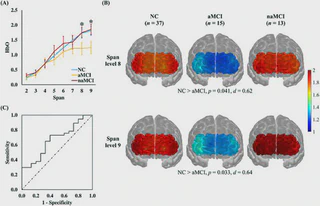fNIRS as a biomarker for individuals with subjective memory complaints and MCI

INTRODUCTION Identifying individuals at risk of developing dementia is crucial for early intervention. Mild cognitive impairment (MCI) and subjective memory complaints (SMCs) are considered its preceding stages. This study aimed to assess the utility of functional near-infrared spectroscopy (fNIRS) in identifying individuals with MCI and SMC.
METHODS One hundred fifty-one participants were categorized into normal cognition (NC); amnestic MCI (aMCI); non-amnestic MCI (naMCI); and mild, moderate, and severe SMC groups. Task-related prefrontal hemodynamics were measured using fNIRS during a visual memory span task.
RESULTS Results showed significantly lower oxyhemoglobin (HbO) levels in aMCI, but not in naMCI, compared to the NC. In addition, severe SMC had lower HbO levels than the NC, mild, and moderate SMC. Receiver operating characteristic analysis demonstrated 69.23% and 69.70% accuracy in differentiating aMCI and severe SMC from NC, respectively.
DISCUSSION FNIRS may serve as a potential non-invasive biomarker for early detection of dementia.